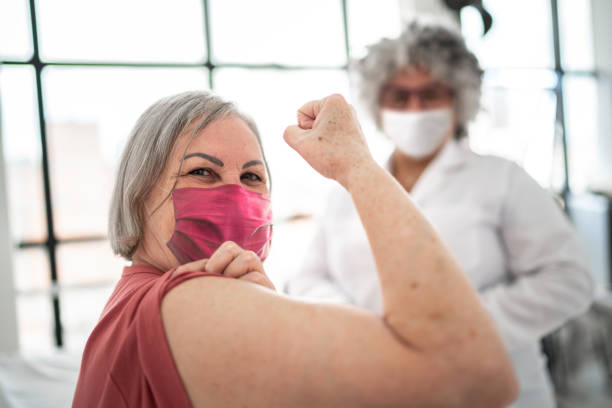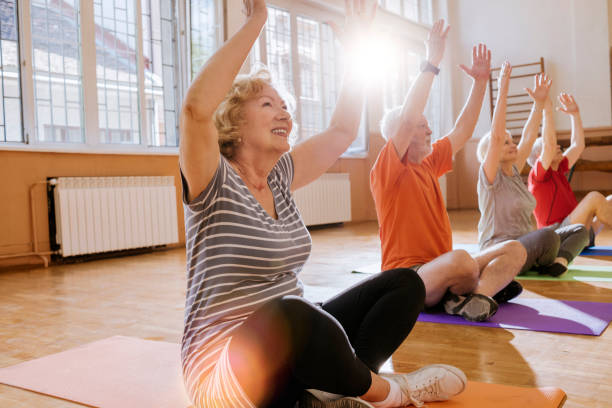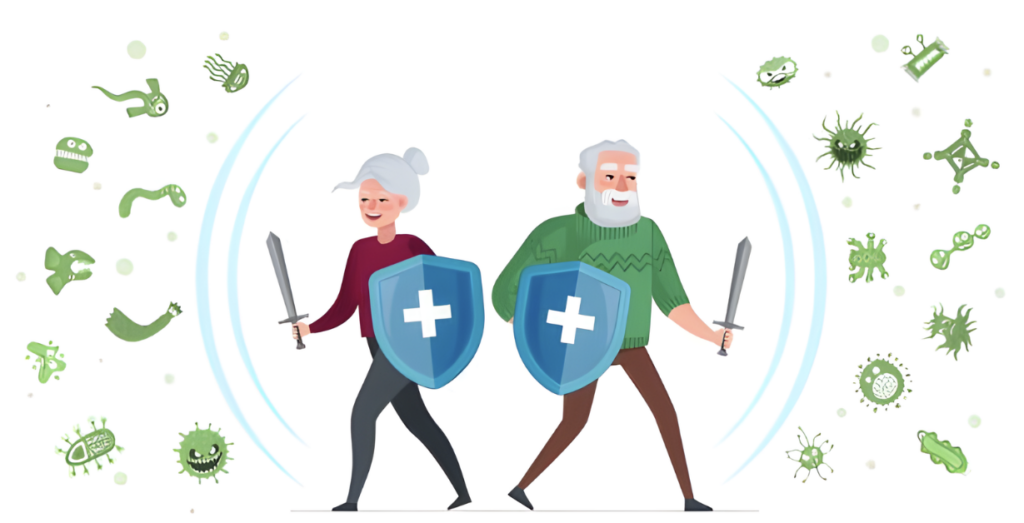Building a strong immune system is critical for seniors to stay healthy and vital as they age. As people age, their immune systems gradually fluctuate, making them more vulnerable to infections and illnesses. However, elders can take proactive actions to strengthen their immune systems and improve their general health.
In this article, we’ll look at evidence-based treatments and lifestyle changes designed specifically for seniors to boost their immune system. We look at practical approaches for older persons to strengthen their immunological resilience and prevent sickness, such as eating a nutritious diet rich in immunity-boosting foods, exercising regularly, and effectively managing stress. By providing seniors with the knowledge and resources they need to support their immunological health, we hope to promote increased vitality, longevity, and quality of life in their golden years.

Understanding the Immune System in Seniors
Aging and Immune Function
People’s immune systems alter as they age, which can reduce their ability to fight infections and diseases. One of the most notable effects is a reduction in immune cell synthesis, which might result in a weaker immune response. Furthermore, the immune system may be less effective at identifying and attacking foreign invaders, increasing the risk of infection and disease.
Chronic inflammation can also impair immunological function in seniors. This occurs when the immune system is constantly active, which can cause harm to healthy tissues and organs. Chronic inflammation can also be linked to a number of age-related disorders, including arthritis, heart disease, and Alzheimer’s.
Common Immune Challenges for Older Adults
Changes in the immune system may make older persons more susceptible to certain infections and disorders. For example, elders are more likely to develop pneumonia, influenza, and shingles. They may also be more susceptible to infections of the urinary tract, skin, and respiratory system.
In addition to infections, elders may be more susceptible to autoimmune illnesses including rheumatoid arthritis and lupus. These disorders arise when the immune system targets healthy tissues and organs, resulting in persistent discomfort and impairment.
Seniors who want to keep their immune system strong as they get older should focus on living a healthy lifestyle. This involves eating a well-balanced diet, engaging in regular exercise, and controlling stress. Seniors should also keep up with prescribed vaccinations, such as the flu and shingles vaccines. Finally, seniors should discuss any immune-related issues they have with their healthcare physician.

Nutrition and Diet for Immune Support
As people age, their immune system deteriorate, making them more vulnerable to infections and diseases. A balanced diet high in important vitamins and minerals, on the other hand, can help elders establish a robust immune system and avoid disease.
Essential Vitamins and Minerals
Certain vitamins and minerals are required for a functioning immune system. Vitamin D, for example, is essential for immune function and can be gained from sun exposure, fatty fish, and fortified meals. Citrus fruits, berries, and leafy greens all contain vitamin C, another crucial component. Zinc is also required for immunological function and can be found in nuts, whole grains, and legumes.
Foods to Boost Immunity
In addition to critical vitamins and minerals, several meals can help enhance immunity. Antioxidants present in fruits and vegetables, such as vitamin A in carrots, broccoli, and spinach, can aid the body fight free radicals. Low-fat dairy products, such as yogurt, can also help enhance immunity by encouraging the growth of good bacteria in the stomach.
Dietary Patterns for Optimal Health
A nutritious diet rich in nutrient-dense foods is crucial for proper immunological function. Seniors should attempt to eat a diet high in fiber, water, and healthy fats, such as nuts and seeds. A diet rich in whole grains, fruits, and vegetables can also supply the nutrients required for a healthy immune system.
Finally, nutrition and food are important in helping elders have a robust immune system. Seniors can maintain their immune system and enhance general health by eating a variety of critical vitamins and minerals, including immunity-boosting foods, and following a good dietary pattern.

Lifestyle Modifications to Enhance Immunity
Seniors can improve their immune system through a variety of lifestyle changes. These changes include more physical exercise, better sleep, and stress-reduction approaches.
The Role of Physical Activity
Physical activity is an important part of a healthy lifestyle, and it can help seniors boost their immune systems. Exercise boosts blood circulation, which helps immune cells spread throughout the body. It also reduces the risk of chronic disorders like obesity, which can impair the immune system.
Seniors should strive to complete at least 150 minutes of moderate-intensity exercise every week. This can include brisk walking, cycling, swimming, and other activities that raise the heart rate. Strength training is also beneficial for preserving muscle mass and bone density.
Importance of Quality Sleep
Quality sleep is essential for immune function. During sleep, the body creates cytokines, which are proteins that aid the immune system in combating infections and inflammation. Lack of sleep can reduce cytokine production, weakening the immune system.
Seniors should aim for 7-8 hours of good sleep each night. To increase sleep quality, people should stick to a regular sleep schedule, limit caffeine and alcohol before bedtime, and create a soothing sleep environment.
Reducing Stress and Its Impact
Chronic stress can damage the immune system, increasing the risk of illness. Seniors can reduce their stress levels by engaging in meditation, deep breathing, or other relaxation techniques. They can also participate in hobbies they enjoy, such as reading, gardening, or spending time with family members.
Alcohol and smoking can also cause stress and impair the immune system. To boost immunological function, seniors should consume alcohol in moderation and quit smoking.
Finally, elders can improve their immune systems through a variety of lifestyle changes. These changes include more physical exercise, better sleep, and stress-reduction approaches. Making these modifications can help seniors improve their general health and lower their risk of infections and chronic disorders.

Preventive Measures and Medical Advice
Vaccinations and Preventing Infections
Vaccinations are an important preventive step for seniors to strengthen their immune systems. Seniors should be immunized against the flu, pneumonia, and other potentially serious illnesses. Flu season is very harmful for seniors, so it’s critical to get vaccinated every year. Vaccines are both safe and effective, and they can help avoid major infections and problems.
In addition to vaccines, elders can take other precautions to avoid diseases. They should wash their hands frequently, refrain from touching their faces, and avoid others who are unwell. Seniors should also get enough rest, consume a balanced diet, and exercise regularly to keep their immune systems strong.
Regular Health Check-Ups and Screenings
Regular check-ups and screenings are essential for seniors to stay healthy and spot problems early. Seniors should visit their doctor on a regular basis for checkups and screenings for problems like heart disease, cancer, and respiratory infections. Early detection can improve results and help elders remain healthy and active.
Seniors should be familiar with the symptoms of common illnesses and infections, such as colds and the flu. If they encounter any symptoms, they should call their doctor immediately. Seniors should also follow their doctor’s recommendations for controlling any chronic diseases they may have, such as diabetes or high blood pressure.
Finally, elders can strengthen their immune systems by following preventive measures and seeking medical counsel. Seniors may keep healthy and active by getting vaccinations, having regular check-ups and screenings, and adopting healthy practices. Seniors who take these precautions can lower their risk of infections, illnesses, and other health issues.
Conclusion
Finally, maintaining a strong immune system is critical for seniors to thrive in their later years. By applying the measures suggested in this article, older persons can proactively boost their immunological system and strengthen their resistance to infections and disorders. From adopting healthy lifestyle choices to embracing immune-boosting foods and supplements, seniors may take control of their immunological defenses and improve their overall well-being.
Furthermore, by prioritizing regular physical activity, appropriate sleep, and stress management skills, seniors can boost their immune systems and improve their quality of life. As we continue to prioritize immunological health in aging populations, it is critical to provide seniors with the knowledge and resources they require to live active and satisfying lives long into their golden years.
Trusted Health, Wellness, and Medical advice for your well-being


